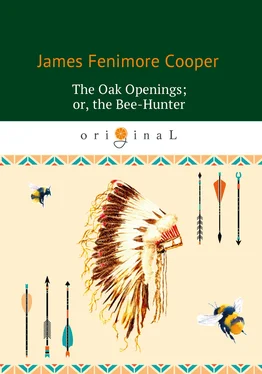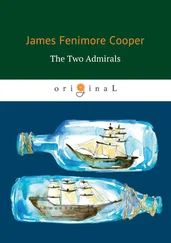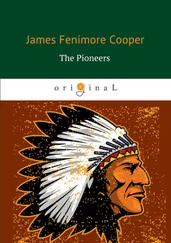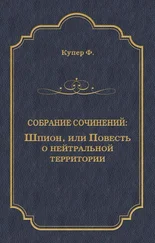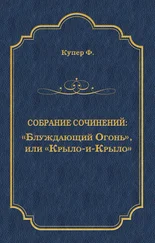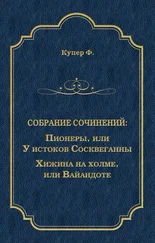But, to return to the narrative: the Kalamazoo could be entered by canoes, though it offered no very available shelter for a vessel of any size. There was no other shelter for the savages for several miles to the southward; and, should the wind increase, of which there were strong indications, it was not only possible, but highly probable, that the canoes would return. According to the account of the females, they had passed only two hours before, and the breeze had been gradually gathering strength ever since. It was not unlikely, indeed, that the attention paid to the river by the warrior in the last canoe may have had reference to this very state of the weather; and his haste to overtake his companions been connected with a desire to induce them to seek a shelter. All this presented itself to the beehunter’s mind, at once; and it was discussed between the members of the party, freely, and not without some grave apprehensions.
There was one elevated point – elevated comparatively, if not in a very positive sense – whence the eye could command a considerable distance along the lake shore. Thither Margery now hastened to look after the canoes. Boden accompanied her; and together they proceeded, side by side, with a new-born but lively and increasing confidence, that was all the greater, in consequence of their possessing a common secret.
“Brother must be much better than he was,” the girl observed, as they hurried on, “for he has not once been into the shed to look at the barrels! Before he went into the openings, he never entered the house without drinking; and sometimes he would raise the cup to his mouth as often as three times in the first half-hour. Now, he does not seem even to think of it!”
“It may be well that he can find nothing to put into his cup, should he fall into his old ways. One is never sure of a man of such habits, until he is placed entirely out of harm’s way.”
“Gershom is such a different being when he has not been drinking!” rejoined the sister, in a touching manner. “We love him, and strive to do all we can to keep him up, but it IS hard.”
“I am surprised that YOU should have come into this wilderness with any one of bad habits.”
“Why not? He is my brother, and I have no parents – he is all to me: and what would become of Dorothy if I were to quit her, too! She has lost most of her friends, since Gershom fell into these ways, and it would quite break her heart, did I desert her.”
“All this speaks well for you, pretty Margery, but it is not the less surprising – ah, there is my canoe, in plain sight of all who enter the river; THAT must be concealed, Injins or no Injins.”
“It is only a step further to the place where we can get a lookout. Just there, beneath the burr-oak. Hours and hours have I sat on that spot, with my sewing, while Gershom was gone into the openings.”
“And Dolly – where was she while you were here?”
“Poor Dolly! – I do think she passed quite half her time up at the beech-tree, where you first saw her, looking if brother was not coming home. It is a cruel thing to a wife to have a truant husband!”
“Which I hope may never be your case, pretty Margery, and which I think never CAN.”
Margery did not answer: but the speech must have been heard, uttered as it was in a much lower tone of voice than the young man had hitherto used; for the charming maiden looked down and blushed. Fortunately, the two now soon arrived at the tree, and their conversation naturally reverted to the subject which had brought them there. Three canoes were in sight, close in with the land, but so distant as to render it for some time doubtful which way they were moving. At first, the bee-hunter said that they were still going slowly to the southward; but he habitually carried his little glass, and, on levelling that, it was quite apparent that the savages were paddling before the wind, and making for the mouth of the river. This was a very grave fact; and, as Blossom flew to communicate it to her brother and his wife, le Bourdon moved toward his own canoe, and looked about for a place of concealment.
Several considerations had to be borne in mind, in disposing of the canoes; for that of Gershom was to be secreted, as well as that of the bee-hunter. A tall aquatic plant, that is termed wild rice, and which we suppose to be the ordinary rice-plant, unimproved by tillage, grows spontaneously about the mouths and on the flats of most of the rivers of the part of Michigan of which we are writing; as, indeed, it is to be found in nearly all the shallow waters of those regions. There was a good deal of this rice at hand; and the bee-hunter, paddling his own canoe and towing the other, entered this vegetable thicket, choosing a channel that had been formed by some accident of nature, and which wound through the herbage in a way soon to conceal all that came within its limits. These channels were not only numerous, but exceedingly winding; and the bee-hunter had no sooner brought his canoes to the firm ground and fastened them there, than he ascended a tree, and studied the windings of these narrow passages, until he had got a general idea of their direction and characters. This precaution taken, he hurried back to the hut.
“Well, Gershom, have you settled on the course to be taken?” were the first words uttered by the bee-hunter when he rejoined the family of Whiskey Centre.
“We haven’t,” answered the husband. “Sister begs us to quit the chiente, for the Indians must soon be here; but wife seems to think that she MUST be safe, now I’m at home ag’in.”
“Then wife is wrong, and sister is right. If you will take my advice, you will hide all your effects in the woods, and quit the cabin as soon as possible. The Injins cannot fail to see this habitation, and will be certain to destroy all they find in it, and that they do not carry off. Besides, the discovery of the least article belonging to a white man will set them on our trail; for scalps will soon bear a price at Montreal. In half an hour, all that is here can be removed into the thicket that is luckily so near; and by putting out the fire with care, and using proper caution, we may give the place such a deserted look, that the savages will suspect nothing.”
“If they enter the river, Bourdon, they will not camp out with a wigwam so near by, and should they come here, what is to prevent their seein’ the footprints we shall leave behind us?”
“The night, and that only. Before morning their own footsteps will be so plenty as to deceive them. Luckily we all wear moccasins, which is a great advantage just now. But every moment is precious, and we should be stirring. Let the women take the beds and bedding, while you and I shoulder this chest. Up it goes, and away with it!”
Gershom had got to be so much under his companion’s influence, that he complied, though his mind suggested various objections to the course taken, to which his tongue gave utterance as they busied themselves in this task. The effects of Whiskey Centre had been gradually diminishing in quantity, as well as in value, for the last three years, and were now of no great amount, in any sense. Still there were two chests, one large, and one small. The last contained all that a generous regard for the growing wants of the family had left to Margery; while the first held the joint wardrobes of the husband and wife, with a few other articles that were considered as valuable. Among other things were half a dozen of very thin silver tea-spoons, which had fallen to Gershom on a division of family plate. The other six were carefully wrapped up in paper and put in the till of Margery’s chest, being her portion of this species of property. The Americans, generally, have very little plate; though here and there marked exceptions do exist; nor do the humbler classes lay out much of their earnings in jewelry, while they commonly dress far beyond their means in all other ways. In this respect, the European female of the same class in life frequently possesses as much in massive golden personal ornaments as would make an humble little fortune, while her attire is as homely as cumbrous petticoats, coarse cloth, and a vile taste can render it. On the other hand, the American matron that has not a set – one half-dozen – of silver tea-spoons must be poor indeed, and can hardly be said to belong to the order of housekeepers at all. By means of a careful mother, both Gershom and his sister had the half-dozen mentioned; and they were kept more as sacred memorials of past and better days than as articles of any use. The household goods of Waring would have been limited by his means of transportation, if not by his poverty. Two common low-post maple bedsteads were soon uncorded and carried off, as were the beds and bedding. There was scarcely any crockery, pewter and tin being its substitutes; and as for chairs there was only one, and that had rockers: a practice of New England that has gradually diffused itself over the whole country, looking down ridicule, the drilling of boarding-schools, the comments of elderly ladies of the old school, the sneers of nurses, and, in a word, all that venerable ideas of decorum could suggest, until this appliance of domestic ease has not only fairly planted itself in nearly every American dwelling, but in a good many of Europe also!
Читать дальше
